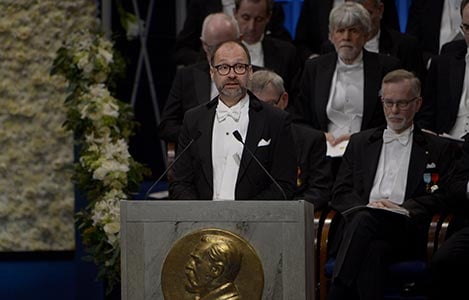Award ceremony speech
English
Swedish
Presentation Speech by Professor Per Strömberg, Member of the Royal Swedish Academy of Sciences, Chairman of the Committee for the Prize in Economic Sciences in Memory of Alfred Nobel, 10 december 2017.

Professor Per Strömberg delivering the presentation speech for the Sveriges Riksbank Prize in Economic Sciences in Memory of Alfred Nobel 2017 at the Stockholm Concert Hall.
Copyright © Nobel Media AB 2017
Photo: Pi Frisk
In the year 1726, something absolutely terrible happened at Strathenry Castle in the south east corner of Scotland: A three-year old boy was kidnapped by a group of drifters passing through the area. His parents sent out an alarm, and soon after a woman was spotted in the vicinity, carrying a crying child. The boy was rescued and happily reunited with his family. If that rescue had not occurred, we might not be standing here today. The boy would not only grow up to become a Professor in Glasgow, and a member of the fabled Royal Society. Adam Smith, as the boy was called, is indeed known as one of the great thinkers of the Enlightenment, and is widely recognized as the founder of modern economics.
Adam Smith wrote two important works. The Wealth of Nations, published in 1776, explains how markets create economic welfare, and introduced the idea that an “invisible hand” guided firms, whose owners were motivated solely by the self-interested pursuit of profit maximization, to produce exactly those goods that households demand.
His other great work, The Theory of Moral Sentiments, was published 17 years earlier. Here, Smith set out to explain the existence of morals and norms in society. He described human behavior as a struggle between our “passions,” focused on immediate satisfaction, and an “impartial spectator,” our long-term oriented and rational self. According to Smith, the struggle between these opposing internal forces makes us vacillate between stupidity and wisdom; impulsivity and responsibility; selfishness and concern for others. Morals and norms help our impartial spectator keep our passions in check, and are necessary for a well-functioning society.
These two monumental works provide two very different views of human behavior, and indeed the tension between them has been evident in economic research for the last 250 years. On the one hand, we see that individuals act irrationally and myopically, leading many to make decisions that do not serve them well. On the other hand, market forces may diminish the role that these individual idiosyncrasies play in shaping economic outcomes – if rational, long-term agents out-compete the irrational and myopic ones, they force the latter either to adapt their behavior or to exit the market.
When Richard Thaler began his career as a researcher in the late 1970s, the rational paradigm had recently made great advances, and created frameworks that are still important for understanding markets, organizations, contracts, and negotiations.
As a doctoral student, however, Thaler observed that most people – including prominent economists – did not behave as the rational agents of economic theory. He started collecting anomalies. In a crucial moment, he realized that insights from cognitive psychology could be used to shed light on many such deviations from rational behavior. Time was ripe to derive new theories and hypotheses that were better grounded in human psychology.
Thaler’s planner-doer model for limited self-control builds on the conflict between our planning and impulsive selves, and can, among other things, be used to analyze how to improve people’s savings behavior.
His research on social preferences shows how people’s preferences for fairness can stop firms from raising prices and cause shortages in times of crisis.
His theory of mental accounting describes how our limited cognition makes us use simple rules-of-thumb when making financial decisions, leading to systematic patterns and biases.
Outside of academia, Thaler’s work has had a significant impact on real-world policymaking, not the least in the area of pension program design. His idea of nudging people to save more has helped to create literally billions of dollars of retirement wealth for ordinary people throughout the world. These programs are clear examples of how insights from behavioral economics can help individuals make better economic decisions.
Dear Professor Thaler: Your work on the consequences of bounded rationality, limited self-control, and people’s sense of fairness has brought key insights from psychology from the fringe of economics to its very center. Your research has been crucial in building the new field of behavioral economics. It has informed public policy, unified social science, and liberated the intellectual legacy of Adam Smith.
It’s an honor and a privilege to convey to you, on behalf of the Royal Swedish Academy of Sciences, our warmest congratulations. I now ask you to receive your Prize from his Majesty the King.
